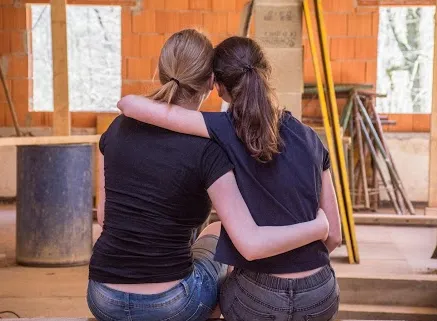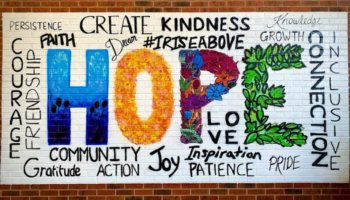Talking Tips
Parents are not as aware

Research shows that:
It just takes one adult. Jefferson County teens who could not ask a parent or guardian for help if they had a serious problem were 3.5 times more likely to have been depressed in the past year and 2 to 3 times more likely to have misused substances in the past 30 days.
Teens do better when they help decide about family decisions that affect them and are involved in making family rules.
Boundaries still matter. Make family, school and sports team rules clear and then stick to them. Let your teens know what will happen if they don’t follow them.
Keep in mind that teen brains are undergoing very rapid development, which can lead to not understanding others’ perspectives, impulsiveness, various types of experimentation and stress. Watch this video “The Mysterious Workings of the Teenage Brain” to find out more.


Maybe it's not always comfortable...
Conversations between any two people can be complicated– and teens are no different.
Some topics can be pretty uncomfortable to bring up at all, distractions are everywhere, and sometimes may seem like you barely get to see your teen– much less have a chance to really talk about the important things.
But it's always important.
In a 2017 survey, Jefferson County youth who reported having an adult to turn to with a serious problem were less likely to:
-
Drink or binge drink
-
Use marijuana or other drugs
-
Hurt themselves (cutting, burning) or attempt suicide
-
Have experienced recent bullying or violence

Subscribe to our newsletter or see our old newsletter
So, here are a few ideas
- Find an opener to start the conversation off in a non-judgmental way that invites open dialogue. You might mention something you’ve seen together in person or on a movie. You could mention a local event or something in the news. You could also text them a news story or send a video (maybe from this website) or news item and then ask what they thought about it.
- Ask open-ended questions (that can’t be answered with “yes,” “no” or a single word)– and by listening for as much of the conversation as you can. If you find that you disagree, try to be curious about how and why your teens sees things differently than you and see if you can find some common ground.
- Use direct language, not euphemisms, so that it’s clear what you are talking about. If you want to talk about sexual violence, you are going to have to use the word rape . If you want to talk about drug use, you’ll need to use the words marijuana or sharing prescriptions. If you want to talk about substance misuse, you are going to have to talk about binge drinking and alcohol poisoning.
- It’s okay to say something is hard for you to talk about because they will notice that anyway and will trust you more if you are upfront about your discomfort. If a topic comes up that you cannot, or do not want to talk about, calmly explain that you won’t discuss it and, if possible, connect them with an adult that will discuss it.
- Circle back if aren’t sure that you did a great job with the conversation or if you feel like something was still bugging your teen. Find another time, soon, to check back in about the topic. And if you promised to follow up with more information or in some other way, of course, then make sure you do that right away.
- Life is busy, but make time to listen to your teen, even when you are busy. When you are having these conversations, make sure that your teen has your full attention and knows you are being present and listening. This includes allowing them to finish telling their story without interjecting and asking questions instead of making assumptions. Be sure to role model putting your phone away when you are focusing on them.
- Don’t BS. Admit when you don’t know something– it may be an opportunity to research something together or allow your teen to have an opportunity to teach you something, which could strengthen your relationship. Also, admitting to not knowing something gives you an opportunity to role model getting more information before you make a decision or form an opinion.
- Don’t give up if it doesn’t go well. Your teen might get angry, become sarcastic, or even refuse to discuss the issue with you. However, starting the conversation opens the door and shows you care. Stick with it and try again. You might also want to ask your teenager for feedback on how and when they prefer to start conversations.When conflict does happen, though, you still have an opportunity to be a role model, including showing how to cope with elevated emotions, make amends, rebuild trust and/or let go of hard feelings.
-
You don’t have to stare at each other. In fact, you might both feel more comfortable talking on the phone about something, sitting on a porch swing, during commercials while watching TV, or in the car. Consider talking while you are doing something you both enjoy, whether that’s going for a walk, pushing younger siblings on swings, baking cookies, getting your nails done, or playing catch. Sometimes looking at each other when you are both uncomfortable is too weird, though other times, and for some teens, that might be the right way to have a conversation,
-
Read up! If you need more information, whether it’s about teen development, substance misuse, setting boundaries, or other issues, remember to talk to your local librarian about how learn more.
Effective Communications
Psychologist Clare Rowe gives us some tips on creating quality and effective conversations that can help your teenager to open up about their feelings.
The mysterious workings of the adolescent brain
Why do teenagers seem so much more impulsive, so much less self-aware than grown-ups? Cognitive neuroscientist Sarah-Jayne Blakemore compares the prefrontal cortex in adolescents to that of adults, to show us how typically “teenage” behavior is caused by the growing and developing brain.






